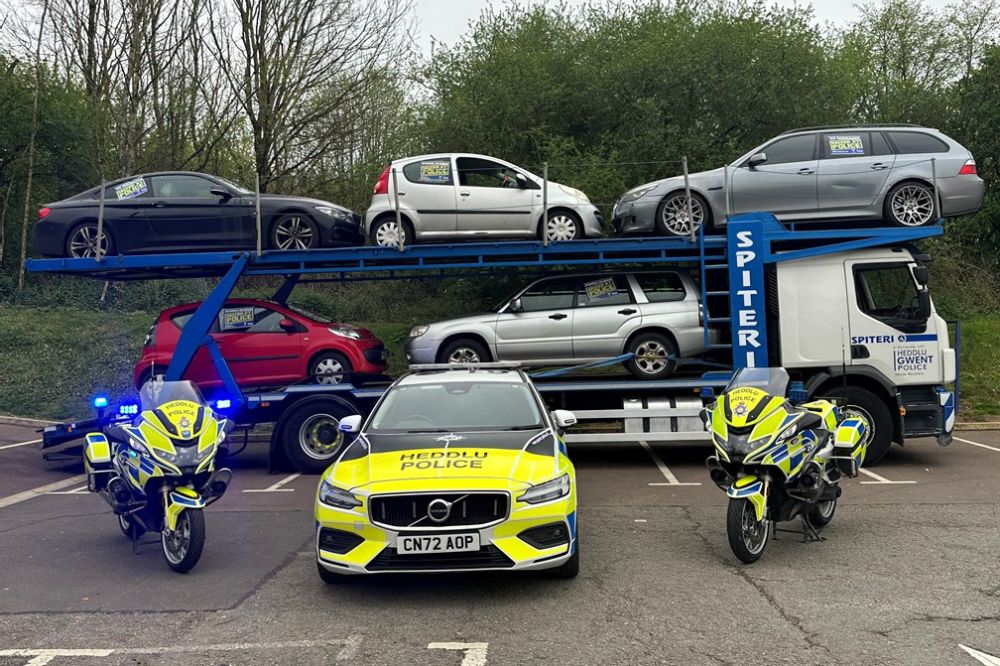Police forces in Wales and London work together in new operation to tackle uninsured driving

Five police forces have worked in collaboration in a first of its kind operation, tackling uninsured driving along the length of the M4 from London to Swansea.
The MIB (Motor Insurers’ Bureau) initiative worked alongside officers from south Wales, Gwent, Avon and Somerset, Wiltshire, and Thames Valley Police on Thursday (April 11).
The operation saw uninsured vehicles seized along the 170 mile stretch of M4 carriageways.
Over a quarter of the stops uncovered secondary offences, including stolen vehicles and drug offences.
This was the first of a series of multi-force one-day operations across UK motorways, led by MIB, the UK entity that exists to protect people from uninsured and hit-and-run drivers.
MIB supported the forces to enable the dedicated resourcing of additional officers, marked vehicles, ANPR cameras, control room operatives and intel staff.
Across the day, officers utilised a number of methods to identify uninsured drivers including Operation Tutelage markers, where cars passing ANPR cameras on previous occasions have been compared to data on the Motor Insurance Database (MID).
Uninsured vehicles with an Operation Tutelage marker are then flagged to police and dealt with at the roadside.
Police intelligence and analysis was also used to establish the whereabouts of uninsured vehicles.
MIB law enforcement liaison officers joined officers at the roadside to support each of the forces.
This provided a direct link to the MID and to the MIB Police Helpline, speeding up the process of confirming a vehicles insurance status.
‘Serious problem’
Superintendent Ryan Francis, from Gwent Police, said: “We’re delighted to have MIBs support, and to work with the other M4 services, in tackling an issue that reaches much further than what is seen on the surface.
“We know that through our efforts today, we’ll have stopped stolen and cloned vehicles, individuals with outstanding court warrants, and disqualified drivers, alongside identifying other traffic offences that pose a risk.
“This collaborative approach provides both focus and attention to a really serious problem in all areas of the UK.”
Superintendent Colin Hudson, Head of Roads Policing for Thames Valley Police & Hampshire Constabulary, said: “Regrettably, some individuals persist in driving without adequate insurance, putting innocent road users at risk. By using the intelligence insights and data from Operation Tutelage and MIB, we’ve successfully removed numerous hazardous vehicles from the roads during this operation.
“Undoubtedly, many of these vehicles will be taken out of commission, preventing the potential harm they could have inflicted if left unchecked. In addition, there is often an overlap in uninsured vehicles and criminal activity on the roads and this operation will contribute to disruption of those activities.”
Martin Saunders, Head of Enforcement at MIB added: “We know that all priorities are pressing for our police colleagues. Whilst we work with the police throughout the year, supporting forces in designating time to focus on uninsured driving allows this issue to be tackled head on in a targeted way.
“We know the benefits will be widely felt across all different areas of the force and the community, making the M4 and surrounding areas safer.
“These multi-force operations are just one more way, in a wider range of initiatives, in which we’re making sure that those flouting the law have nowhere to hide.”
Support our Nation today
For the price of a cup of coffee a month you can help us create an independent, not-for-profit, national news service for the people of Wales, by the people of Wales.






